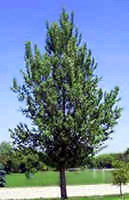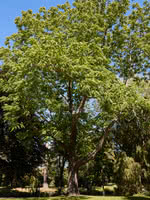Mon-Fri 9am - 5pm Mountain time
Hill Poplar vs Black Walnut
Populus x Hill
Juglans nigra
CUSTOM GROW
NOT AVAILABLE THIS SEASON - MIGHT RETURN
Hill Poplar is a hardy, fast-growing tree with a narrow crown. Hill Poplars function well as a privacy screen or windbreak.
This attractive, long-lived shade tree is a great choice for home and commercial consumers alike, as it requires little pruning or maintenance care.
Hill Poplar has largely been replaced by more desirable hybrid poplar varieties that are more resistant to disease.
The Black Walnut is a slow growing, large, straight-stemmed tree with an open crown. It produces dense, very hard, edible nuts.
Black Walnut has a deeply-furrowed, black bark. Its leaves are about 1 foot long, composed of 15 - 23 slightly stalked leaflets on a moderately stout stock which provide good dappled shade.
Despite being highly valued for its edible nuts and its shade tree aesthetics, it is rare to see this tree on the prairies.
Note: Black Walnut's roots produce a substance named juglone that is toxic to some other plants. Consider this when choosing where you plant a black walnut, as you will not be able to grow tomato, potato, cabbage, eggplant, blueberry, azalea, rhododendron, lilac, red pine and apple in the surrounding area.
Note: Plant this tree once. It will not respond well to transplanting.
Note: Although self-pollinating, planting two trees significantly improves nut production.
A top CO2 absorbing species. Experts think this tree may help climate change more than others.
Hill Poplar Quick Facts
Black Walnut Quick Facts
In row spacing: 2.4 m (8 ft)

